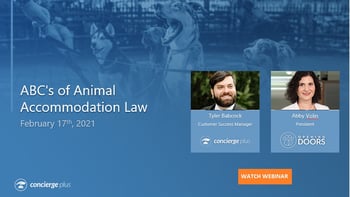Nothing strikes fear into a community manager’s heart quite like receiving a fair housing violation notice. Even if the community is ultimately absolved of any wrongdoing, an investigation is disruptive, expensive, and messy.
The U.S. Department of Housing and Urban Development (HUD) recently approved a settlement between the complainant and nineteen apartment complexes in Philadelphia that were accused of disability discrimination for their refusal to grant a reasonable accommodation. Under the agreement, defendants will pay $115,000 divided as $90,000 to a fair housing entity and $25,000 to the complainant. While the agreement doesn’t reveal much about the events leading to the discrimination charge, HUD leaves a few gold nuggets of advice for community managers. It’s wise to heed them.
1. HUD is actively investigating disability discrimination cases.
According to former HUD Secretary Ben Carson, the majority of their charges involve disability discrimination for a service or assistance animal (an “emotional support” animal is one type of assistance animal). Even with the chaos wrought by 2020, HUD has not slowed down investigating discrimination complaints. It is more important than ever to remain diligent about responding to reasonable accommodation requests.
2. Discrimination charges are expensive.
The costs involved in fair housing claims pile up quickly. In addition to the cost of litigation, communities can be liable for a statutory penalty, complainant’s attorney fees, and, depending on the egregiousness of the circumstances, punitive damages. The award of attorneys’ fees is often greater than any damages the defendant pays directly to the complainant. In the Philadelphia case, while the specifics are lacking it’s likely that the $90,000 payment is covering the petitioner organization’s testing and legal costs. That’s not to say that direct penalties aren’t substantial – quite the opposite. The fine for the first violation is $21,410 and it increases to $107,050 for the third violation. Include defendant’s own legal expenses and these cases swiftly become financially devastating.
3. Animals are medical aids.
There is a perception that animal accommodations require a heightened burden of proof than other types of accommodations. But HUD makes it clear that a request for a service or assistance animal is no different in form or function than a request for a grab bar in the bathroom or a designated parking spot. These animals aren’t pets–they’re a medical aid more akin to a wheelchair than Fido in a legal sense. Certainly, fewer people are requesting ramps than an animal accommodation, but that’s because animals can alleviate the symptoms or effects of limitless types of disabilities, as opposed to solely mobility impairment.
4. Create a plan for your community.
One of the most important lessons from this settlement is HUD’s insistence that defendants develop and implement a “Reasonable Accommodation Policy and Procedure.” This plan should include items such as: designating the entity that created and is monitoring the plan, the laws on which the policy is based, outlining training protocols, detailing examples of potential accommodation requests, describing the verification and appeal process, and noting recordkeeping practices, among others.
Having a detailed and legally sound policy in place is crucial when defending a discrimination charge. Process and protocol can save your community because they can be used to establish compliance with local and federal fair housing laws.
Concierge Plus can help by allowing communities to document all policy and training protocols in its pet module, create tasks for managers to mark the specific steps taken, and easily demonstrate compliance.
The old adage rings true: ounce of prevention is worth much more than a pound of cure.
Learn the ABC's of Animal Accommodation Law. Watch our webinar now.
Opening Doors PLLC is a legal and consulting firm that focuses on animal accommodation law and builds safer pet-inclusive communities. Contact us at info@pawsopeningdoors.com for more information.
The information on this website is provided by Opening Doors PLLC for informational and advertising purposes only. The information and materials herein should not be construed as legal advice and do not create an attorney-client relationship.




Share This Post